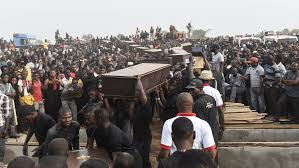At least 43 people were confirmed dead and scores more injured or missing after suspected armed herders launched coordinated attacks on rural communities in Benue State on the evening of Sunday, June 1.
The raids, described by survivors as “guerrilla-style,” struck Tse-Antswam near Naka in Gwer West and Edikwu-Ankpali near Owukpa in Apa Local Government Area, leaving entire villages deserted.
Witnesses said the gunmen opened fire on fleeing residents around 7 p.m., targeting farmers and families in their homes. Women and children were reportedly among the victims. Local sources initially feared 33 fatalities, but by the next day, the death toll had risen to 43. Mass graves were later discovered in the affected areas.
Community leaders reported recovering 28 bodies from Edikwu-Ankpali and 17 others from Tse-Antswam, with many more still unaccounted for. According to them, the victims bore both gunshot and machete wounds. Survivors described how some residents jumped into wells or hid in bushes to escape the onslaught.
“There is nobody presently in the community because they ran away for their lives,” one lawmaker said, underscoring the scale of displacement. Entire settlements were found emptied out by search patrols. Hundreds of people, mostly subsistence farmers, are now displaced, many seeking refuge in schools, churches, or makeshift camps organised by local vigilantes.
The killings drew condemnation from religious leaders, lawmakers, and civil society groups. The Charismatic Bishops Conference of Nigeria (CBCN), at a briefing in Abuja, demanded decisive federal action. Bishop Leonard Kawas, CBCN President, called the violence “intolerable” and urged President Bola Tinubu to declare a military emergency in Benue. He expressed solidarity with Bishop Wilfred Anagbe of the Makurdi Diocese, who has been outspoken on the crisis.
In the state assembly, lawmakers voiced frustration over delayed security responses to the situation. James Umoru, a member of the Benue State House of Assembly, criticised security agencies for arriving hours after the attackers had retreated. “The situation is alarming,” he warned. “Continuous silence could further plunge the region into a humanitarian crisis.” He said sustained attacks have crippled agriculture across Apa and the Gwer West area of the state.
However, the Benue State Government struck a defensive tone. Governor Hyacinth Alia’s media aide dismissed calls for a state of emergency as “pure hypocrisy” and said the governor had deployed troops, noting that the military remains under federal control.
Beyond the government quarters, grief and outrage rippled across the public sphere, as Fr. Kelvin Ugwu, a Catholic priest originally from Benue and now based in The Gambia, criticised leaders’ inaction in a social media post, writing: “It is not a great thing that you come to Facebook every market day to announce… the number of people that have been butchered.”
The Pathfinders Arewa Project, a northern civil advocacy group, cautioned against portraying the crisis as a matter of religious persecution. “Framing the violence solely through a religious or ethnic lens is dangerous and misleading,” their chairman stated. He questioned why emergency rule was being considered for Benue but not for northern states like Zamfara or Katsina, which have experienced even higher casualty rates.
Benue, in Nigeria’s restive Middle Belt, has for years been a flashpoint in disputes between indigenous farmers and nomadic herders. Analysts say a mix of land pressure, climate stress, and weak law enforcement has driven these deadly cycles. Amnesty International reports that more than 6,800 people have died in Benue since the start of 2023. This number is more than any other state in the country.
The June 1 attacks are part of a wider insecurity trend in Nigeria. In April, dozens were killed in Plateau and Benue in similar raids. Weeks before the latest tragedy, at least 56 people died in an Easter weekend assault. Security data reviewed by nationwide press shows that in a single week in May, armed groups killed 64 and abducted 17 across 11 Nigerian states.
Benue’s rural economy is under siege. The state’s farmland lies fallow as villagers abandon their homes. A Catholic bishop recently described the violence as “organised and genocidal,” alleging that assailants are renaming conquered villages.
Though shocking in scale and brutality, the events of June 1, 2025, represent a broader pattern. It shows the rising rural violence in Nigeria’s hinterlands. For many survivors now in overcrowded shelters, the only certainty is the loss of homes, families, and futures. As one resident put it, “We no longer live… we only run.”


